Cilantro – An Exotic Herb Since Antiquity – A Love Hate Relationship
By: Habeeb Salloum/Arab America Contributing Writer
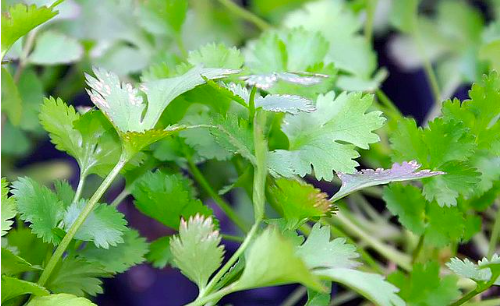
A food writer once took a survey of cilantro and found that 90% of the people polled loved the herb while the rest abhorred the smell and despised its taste. My late brother once planted a big bed of cilantro and one day I went to visit him and found him digging the cilantro out of his garden.
“What are you doing?”, I asked.
“I hate this stuff that my wife made me plant in our garden! It seems that every time I dig a plant out, another two pop up in its place! I can’t get rid of this awful herb.”
Apparently, my brother belonged to the 10% of those who hated cilantro labelling it an ‘offensive herb’. He did not like it. Interestingly, as more recent research provides, to dislike the herb may be as a result of the inherited olfactory-receptor genes that affect taste, contributing to liking it or not.
Cilantro, one of the oldest herbal condiments known to humankind, called, as well, fresh coriander, is also known as Chinese, Mexican, Spanish or Thai parsley, and is thought to be the first herb used by humans in the countries bordering the Mediterranean, a wild species of it from antiquity still found today in Egypt and the Sudan. However, some claim it was first cultivated in China at least 7,000 years ago. In our times, it is widely grown in all parts of the world, but only in Morocco, western Asia, India, China and the South American countries is it cultivated and used on a large scale.
Historically, the coriander plant has been known to almost every Asian, Arab, African, and European civilization. In ancient China it was believed that coriander bestowed immortality on those who constantly used it in their cooking. In the Egypt of the Pharaohs, it was thought to be a food fit for the gods. Coriander seeds have been found in ancient Egyptian tombs, apparently as a food offering for the next world.
The Bible (Exodus XVl, 31) compares coriander seed to the manna that fell from Paradise. On the other hand, the Romans who used it extensively in making bread and preserving meats, did not all agree on its qualities. Pliny considered the best coriandrum in his time to be from Egypt yet described it as having a ‘buggy’ smell. In later centuries Charlemagne, who loved its taste, ordered that it be grown in all his Imperial gardens.
During the medieval ages, the Arabs used this herb on a massive scale, sometimes including ‘coriander water’ in their recipes. Avicenna, included it among the important medicinal herbs in his renowned Canon of Medicine. The Arabs not only enjoyed its exotic flavour, but also believed that it stimulated sexual desire. In the well-known Arabian classic, A Thousand and One Nights, coriander is mentioned as an aphrodisiac and part of the potion that helped cure a childless merchant. After the discovery of the New World the Conquistadors introduced the coriander plant into the Americas in the 16th century.
Cilantro leaves are harvested when the plant is about six inches high. Their racy-mild flavour differs from that of the seed, and their pronounced pungency always adds an exotic touch to the taste of food. Numerous types of salads, sauces, curries, soups, stews and meat loaves are made tempting when cilantro is an ingredient. Dishes are made more appetizing and full of an unique flavour. Even though their sapidity is not, in many instances, acceptable to many, overwhelmingly, their unusual flavour makes one a devotee of the herb.
Worldwide these savoury leaves, which are rich in Vitamins A & C, are used in cooking and decorating more than parsley. In Latin American and eastern cuisine, they are used as a basic flavouring ingredient in a vast number of dishes. As well, many cuisines such as those in the Middle East, use cilantro to garnish main course platters making the herb important to the culinary artists in these lands as parsley is to the western cook.
During the summer months, when cilantro is plentiful, the fresh leaves, along with their stems, can be washed, then frozen in plastic bags to be used in soups and stews. They will keep for a long period of time. When ready to use, as much as is needed should be chopped, then the remainder returned to the freezer. The taste will only vary slightly from the leaves that are fresh.
In the Mediterranean world, cooks have included, for many centuries, cilantro in their salads, soups and stews. Delightful tasty dishes have been the result. There is little doubt that these few recipes from the Middle East and North Africa will attest to this. Despite my brother and others’ similar views on cilantro, for me it is the number herb to enhance any dish.
Artichoke Hearts in Vinegar – Maazat Khurshoof
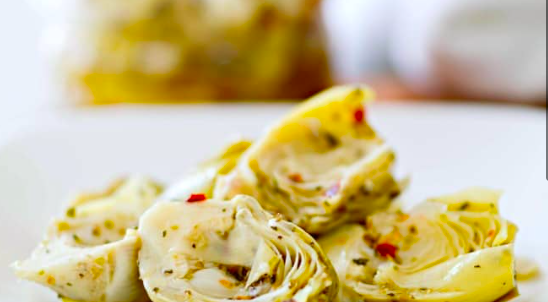
Serves 4 to 6
2 cans artichoke hearts (14 oz each), drained and quartered
3 tablespoons olive oil
2 tablespoons vinegar
1 clove garlic, crushed
2 tablespoons finely chopped cilantro
1 teaspoon thyme
1/2 teaspoon salt
1/4 teaspoon black pepper
pinch of cayenne
Place artichokes in a serving bowl and set aside.
Thoroughly combine remaining ingredients then pour over artichokes. Toss, then immediately serve.
Yemeni Lentil Soup – Shurabat Adas Yamani
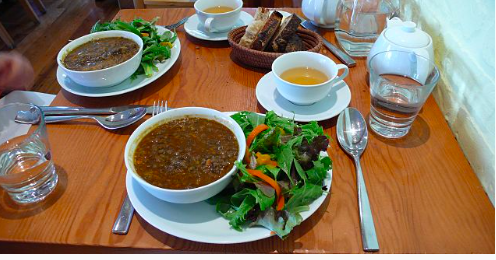
Serves about 8
1 cup brown or green lentils, rinsed
10 cups water
5 tablespoons olive oil
1 cup beef or lamb, cut into very small pieces
2 medium sized onions, finely chopped
4 cloves garlic, crushed
1/2 cup finely chopped cilantro
2 large tomatoes, finely chopped
2 teaspoons salt
1 teaspoon cumin
1/2 teaspoon black pepper
1/4 teaspoon allspice
1/8 teaspoon cayenne
Place lentils and water in a pot, then bring to a boil. Cover and cook over medium heat for 15 minutes.
In the meantime, heat oil in a frying pan, then sauté meat over medium-low heat for 10 minutes. Stir in onions, garlic and coriander leaves then sauté for further 8 minutes. Add tomatoes, then sauté for further 5 minutes. Add frying pan content and remaining ingredients to lentils. Cover pot and bring to boil, then simmer over low heat for about 50 minutes or until meat is well-cooked. Serve hot.
Cilantro and Yogurt Salad – Salatat Kizbara
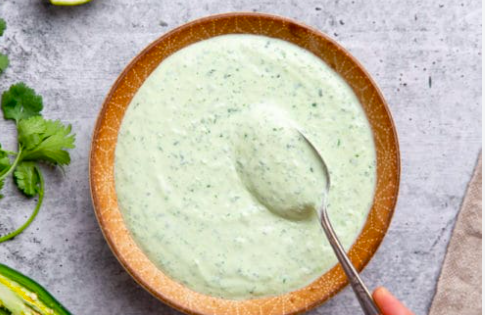
Serves 6
2 cups finely chopped cilantro
4 cups plain yogurt
3 cloves garlic, crushed
1 1/2 teaspoon salt
1/2 teaspoon black pepper
1 teaspoon dried mint leaves
Thoroughly combine all ingredients in a serving bowl then cover and refrigerate for 1 hour.
Baked Tomatoes – Al-Duqous
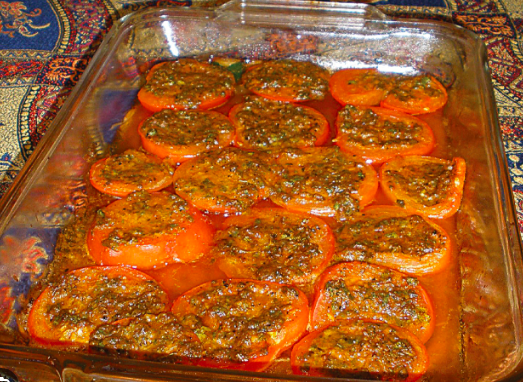
Serves 6 to 8
4 large tomatoes (about 2-pounds), sliced about 1/4 inch thick
6 cloves garlic, crushed
4 tablespoons finely chopped cilantro
4 tablespoon olive oil
1 teaspoon paprika
3/4 teaspoon salt
1/2 teaspoon dried basil
1/4 teaspoon black pepper
1/8 teaspoon cayenne
Place tomato slices in a casserole.
Combine remaining ingredients then spread evenly over tomatoes. Cover, then bake in a 350oF preheated oven for 20 minutes. Serve hot from casserole.
Fried Liver with Garlic
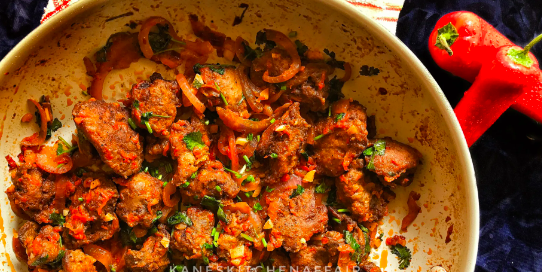
Serves 4
5 cloves garlic, crushed
1 small hot pepper, seeded and very finely chopped
4 tablespoons very finely chopped cilantro
1/2 teaspoon salt
1/2 teaspoon black pepper
1/2 teaspoon allspice
4 tablespoons oil
1-pound calf or baby beef liver, cut into 3/4-inch pieces
Thoroughly combine garlic, hot pepper, fresh coriander leaves, salt, pepper and allspice then set aside.
Heat oil in a frying pan, then sauté liver pieces over fairly high heat until the liver barely begins to brown. Stir in the garlic mixture, then stir-fry for a few moments. Serve sizzling hot.
White Bean and Lamb Stew
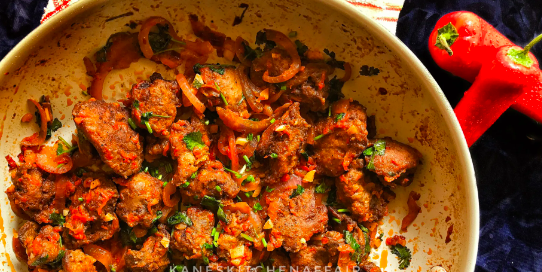
Serves 8
1 1/2 cups white beans, soaked overnight in water
mixed with 1/2 teaspoon baking soda
2-pounds bone-in lamb shoulder, cut into eight
pieces
1 small onion
2 cinnamon sticks
4 cardamom pods
4 tablespoons tomato paste diluted in 3 cups water
3 tablespoons lemon juice
1 teaspoon salt
1 teaspoon black pepper
1 cup finely chopped cilantro
1/8 teaspoon cayenne
In a saucepan, cover rinsed beans with 2 inches of water. Bring to a boil, reduce heat to medium, cover, and cook until tender, about 30 minutes. Remove from heat, let sit for 5 minutes, then rinse in cold water and drain well. Set aside.
In another saucepan, cover lamb, onion, cinnamon, and cardamom with 1-inch water. Bring to a boil, remove froth, then lower heat to medium, cover, and cook for 1 hour, or until meat is tender. Remove onion, cinnamon, and cardamom.
Stir in remaining ingredients and bring to a boil. Reduce heat to medium-high, cover, and cook for 10 minutes, stirring occasionally.
Stir in beans, bring to a boil, reduce heat to medium, cover, and cook for 15 minutes.
Serve immediately.
Fish and Rice Stew – Marake Kaloune
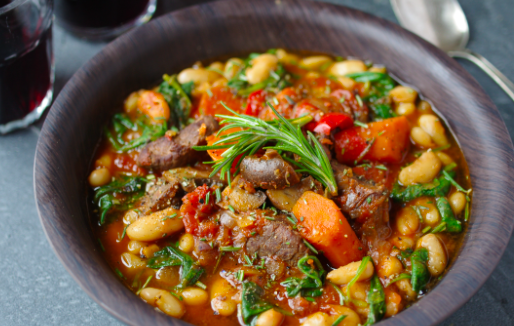
Serves 6
2 teaspoons salt
1-pound salmon or similar fish fillet, cut into 1-inch cubes
5 tablespoons cooking oil
3 medium potatoes, halved lengthwise and sliced into half-rounds
1 large onion, sliced into thin rounds
1/4 cup finely chopped fresh or frozen okra
1 eggplant, about 1/2-pound, peeled and diced into 1-inch cubes
2 cups stewed tomatoes
1 cup chopped cilantro
1 tablespoon pomegranate concentrate
6 cloves garlic, crushed
1 teaspoon garam masala or any type of powdered curry
1 teaspoon black pepper
1/8 teaspoon cayenne
1 cup rice, rinsed
2 cups water
Take 1/2 teaspoon of the salt and sprinkle it on the fish cubes then set aside for 1 hour.
Heat oil in a saucepan then fry the fish for 8 minutes over medium-low, turning them over once. Remove fish and set aside.
In the same oil, fry the potatoes over medium heat for 5 minutes then add the onion. Gently stir-fry until potatoes begin to turn light brown, adding more oil if needed. Add the remaining ingredients, except the rice, and enough water to cover then stir and bring to a boil. Cook covered over medium-low heat for 30 minutes, adding more water if necessary.
Stir in the rice and the 2 cups water, cover, then cook over low heat for 15 minutes, stirring and re-covering often to ensure rice does not stick to bottom of saucepan.
Serve hot.
Check out Arab America’s blog here!








